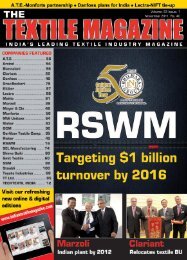policy initiatives - Textile Magazine
policy initiatives - Textile Magazine
policy initiatives - Textile Magazine
You also want an ePaper? Increase the reach of your titles
YUMPU automatically turns print PDFs into web optimized ePapers that Google loves.
technology<br />
obliged to comply with the defined<br />
limit values in all certification processes.<br />
By also regulating these substances<br />
under the product-related OEKO-<br />
TEX Standard 100, the OEKO-TEX<br />
Association expects to have a significant<br />
impact on the global textile<br />
chain so that the use of these kinds<br />
of tensides will be considerably reduced.<br />
In order to start helping to<br />
eliminate alkylphenolethoxylates<br />
even sooner, the OEKO-TEX Association<br />
will begin testing for alkylphenolethoxylates<br />
straightaway as<br />
part of its regular control tests, and<br />
during company audits it will be<br />
helping certificate-holders to identify<br />
at this early stage the possible<br />
sources of this group of substances<br />
in their delivery chain, and to find<br />
substitutes.<br />
Alkylphenolethoxylates have<br />
been excluded since 1995 under the<br />
production-based certification of environmentally-friendly<br />
production<br />
sites in accordance with the OEKO-<br />
TEX Standard 1000, and are tested<br />
for accordingly by the OEKO-TEX<br />
General Managers of Oeko-Tex institutes meeting in Delhi<br />
member-institutes.<br />
The OEKO-TEX General Managers<br />
attending the meeting in Delhi<br />
were also unanimous in agreeing to<br />
extend the scale of regular control<br />
testing of certified products worldwide<br />
from the current level of at<br />
least 15 per cent of all certificates<br />
issued annually to 20 per cent in future.<br />
In practice, in recent years an<br />
average of 18 per cent of the certificates<br />
have already been tested at the<br />
OEKO-TEX Association’s own expense,<br />
using product samples taken<br />
from retailers.<br />
Another innovation that was introduced<br />
at the meeting was a supplement<br />
listing additional specifications<br />
which would enable special<br />
articles such as tents, buggies or<br />
push-chairs, office chairs and rucksacks<br />
to be certified under the OE-<br />
KO-TEX Standard 100, with immediate<br />
effect.<br />
Finally, the heads of the OEKO-<br />
TEX institutes announced that the<br />
forthcoming 20th anniversary of<br />
testing for harmful substances under<br />
the OEKO-TEX Standard 100<br />
would be appropriately marked by<br />
some special promotions. Planned<br />
projects include a re-launch of the<br />
existing 16-language website at<br />
www.oeko-tex.com, a specialist<br />
international conference, a Knowledge<br />
Olympics for specialist retailers<br />
in eight European countries and<br />
a competition for a media and corporate<br />
prize on the theme of sustainability.<br />
India has issued 624 currently<br />
valid OEKO-TEX certificates, thus<br />
being the fifth in an international<br />
comparison of the countries issuing<br />
the most certificates, behind<br />
China, Germany, Turkey and Italy.<br />
Since the first OEKO-TEX branch<br />
office was opened in India in 2005,<br />
demand for OEKO-TEX product<br />
certifications from local companies<br />
at all stages of the processing chain<br />
has increased steadily and continues<br />
to do so.<br />
Customer enquiries are now handled<br />
by four OEKO-TEX agencies,<br />
in Mumbai, Delhi, Tirupur and<br />
Ahmedabad, with a further office in<br />
Sri Lanka.<br />
•<br />
The <strong>Textile</strong> <strong>Magazine</strong> jANUARY 2012 | 57






